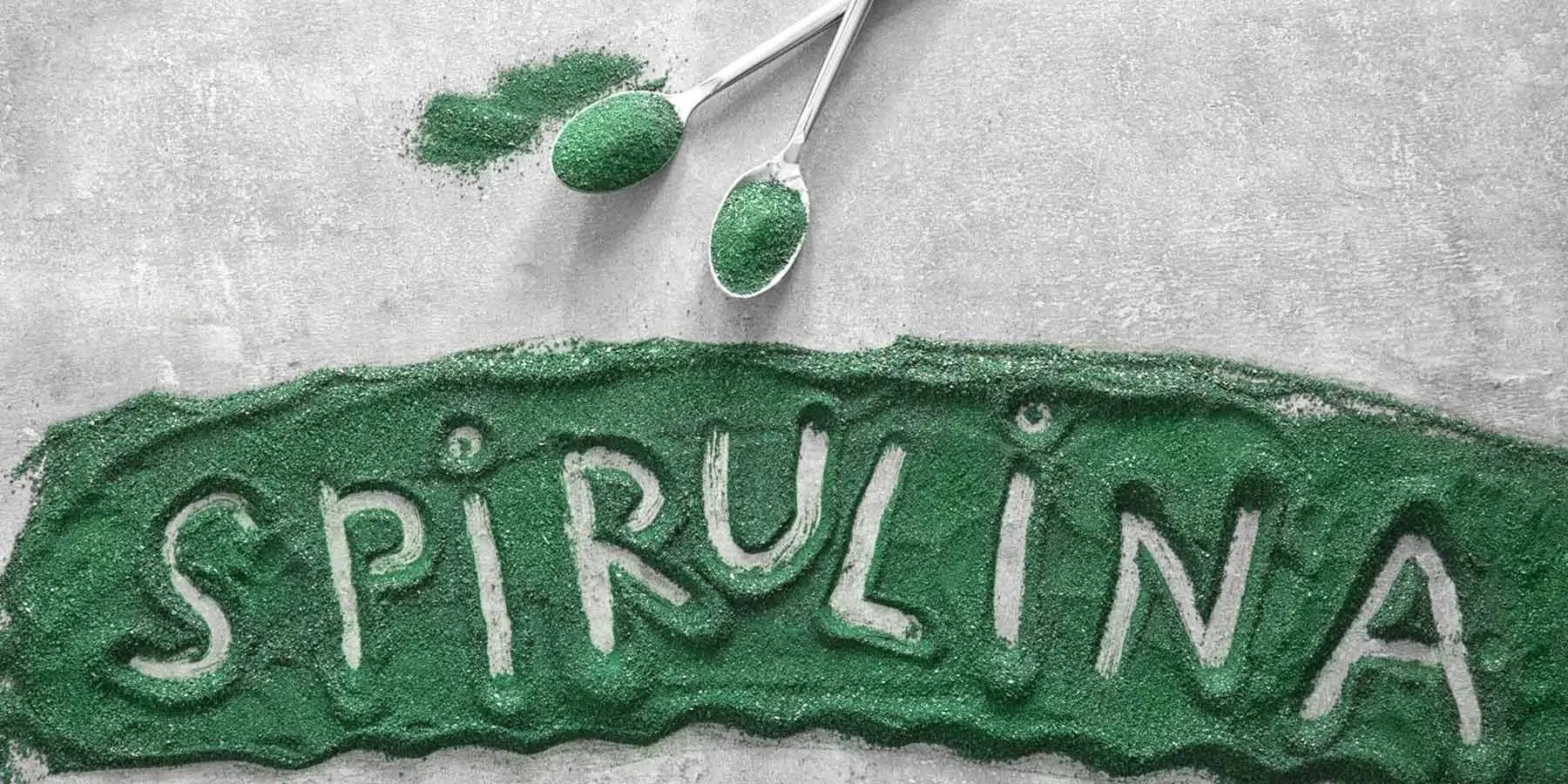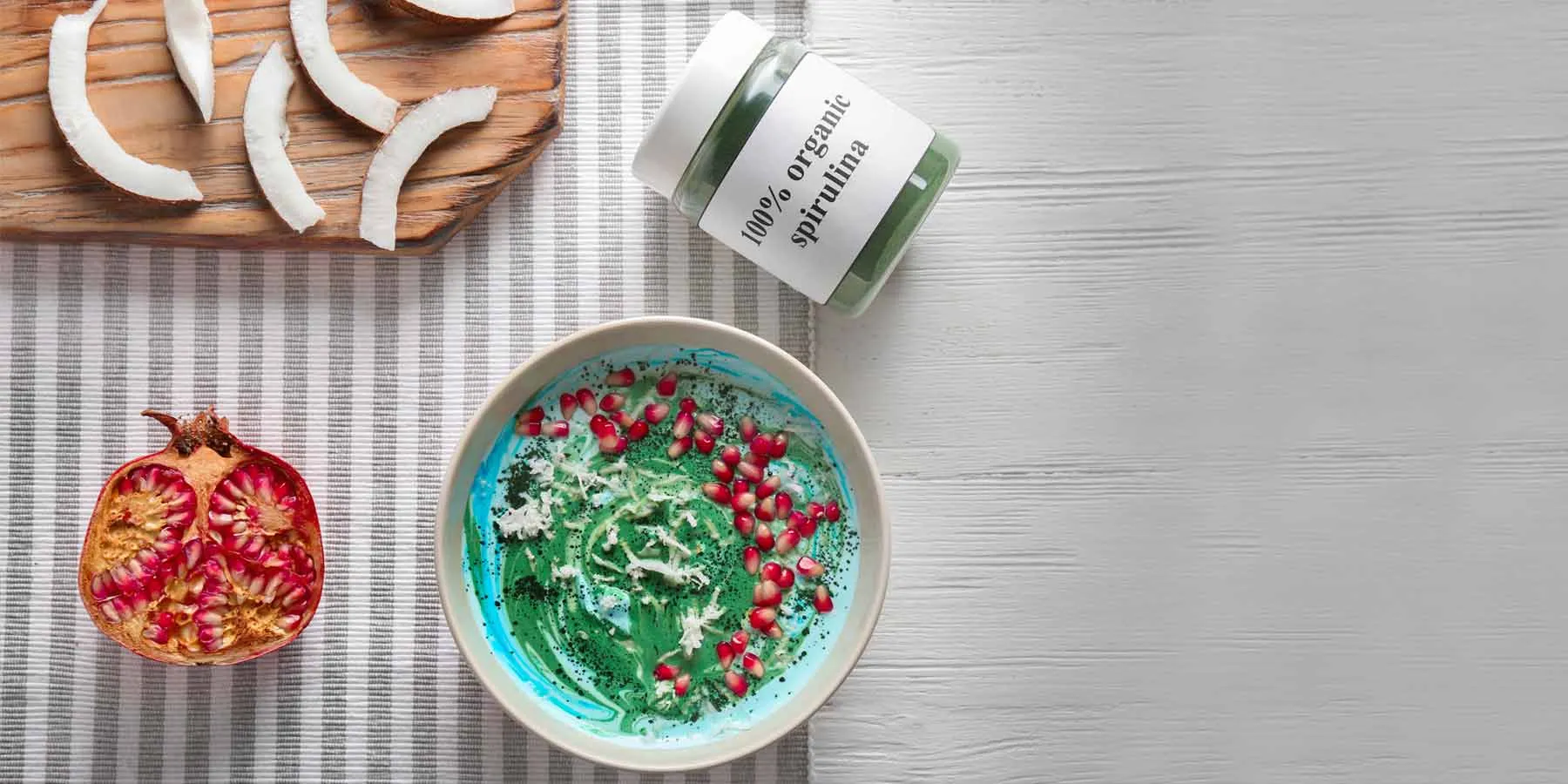Benefits and Uses of Spirulina

What is Spirulina?
Spirulina is a type of blue-green algae that grows in both salt and fresh water. Spirulina is not really a nutritional supplement, but an incredibly dense and complete food made from commercially cultivated microalgae.
Spirulina has one of the highest concentrations of chlorophyll of any food known. Chlorophyll has numerous health benefits; it's well known for its ability to break down and eliminate toxins and heavy metals such as DDT, PCBs, mercury, cadmium, and lead. Spirulina has also been shown to be beneficial for gastrointestinal problems, fighting infections and helping your body assimilate calcium and balance other trace minerals.
To date, there are over 1,800 peer-reviewed scientific articles evaluating its health benefits. Plus, thanks to its impressive nutrient profile, aid programs around the globe have even started popping up to set up spirulina production in areas struggling with malnutrition. Research continues to uncover more and more potential benefits of spirulina, and studies have shown that adding spirulina to your routine could help detoxify your body, boost energy levels and even enhance brain function.
What does Spirulina do?

1. Detoxes Heavy Metals (Especially Arsenic)
Affecting people all over the globe, chronic arsenic toxicity is a problem. According to the World Health Organization, the U.S. is one of the countries affected by inorganic arsenic that is naturally present at high levels.
Arsenic toxicity is an even bigger problem in the Far East. In the words of Bangladeshi researchers, “Millions of people in Bangladesh, India, Taiwan and Chile are consuming a high concentration of arsenic through drinking water, and thousands of them have already developed chronic arsenic poisoning.”
2. Eliminates Candida
According to researchers, “Candida species belong to the normal micro biota of an individual’s mucosal oral cavity, gastrointestinal tract and vagina.” What does that mean? Well, without a healthy micro flora balance in our body, we are simply much more susceptible to sickness and disease.
Leaky gut syndrome and improper digestion are directly connected to micro floral imbalance. Not only is invasive candidiasis the leading cause of mycosis-related death in the U.S., candida overgrowth has become the hallmark sign for most autoimmune diseases today.
Because of our shift toward a diet rich in sugar and unnatural ingredients, antimicrobial resistance and ineffective antifungal drugs, we have seen a significant rise in yeast infections since the 1980s.
Several animal studies have shown that it’s an effective antimicrobial agent, particularly for candida.
Specifically, spirulina benefits have been shown to promote the growth of healthy bacterial flora in the intestines, which in turn inhibits candida from thriving. Additionally, the immune-strengthening properties of spirulina can help the body eliminate candida cells.
3. Improves HIV/AIDS
Up until recently, epidemiologists have been puzzled trying to understand why people in Japan, Korea and Chad have relatively low HIV/AIDS rates. One possible explanation, revealed in a 2012 study published in the Journal of Applied Phycology, may be the amount of algae that people in these areas regularly consume!
When researchers took 11 HIV patients who have never taken antiretrovirals, they split the participants into three groups: one that was assigned to eat 5 grams of brown seaweed every day, one that was to eat 5 grams of spirulina, and one that ate a combination of both. After the three-month trial period was complete, two key findings were discovered:
- Absolutely no adverse effects were experienced from both seaweed varieties and the combination.
- CD4 cells (T-helper white blood cells that fight infection and are used to stage HIV) and HIV-1 viral load (another HIV biomarker) remained stable.
The results were so promising that one participant volunteered to continue the study for an additional 10 months, and this participant actually benefited from “clinically significant improvement in CD4 and decreased HIV viral load.” Therefore, spirulina deserves a place in natural HIV treatment.
4. Helps Prevent Cancer
According to the Milton S. Hershey Medical Center, “A number of animal and test tube studies suggest that spirulina increases production of antibodies, infection-fighting proteins, and other cells that improve immunity and help ward off infection and chronic illnesses such as cancer.”
This doesn’t come as a surprise as more than 70 peer-reviewed articles have been published in the scientific literature evaluating spirulina’s ability to affect cancer cells.
In an article published this past April, Czech Republic scientists pointed outthat, in addition to its ability to control blood cholesterol levels, “Spirulina is also rich in tetrapyrrolic compounds closely related to bilirubin molecule, a potent antioxidant and anti-proliferative agent.”
When tested on human pancreatic cells, these researchers discovered that, “Compared to untreated cells, experimental therapeutics significantly decreased proliferation of human pancreatic cancer cell lines in vitro in a dose-dependent manner.” suggesting that spirulina may be a potential cancer treatment.
5. Lowers Blood Pressure
Phycocyanin is a pigment found in the spirulina that scientists have discovered possesses antihypertensive effects, lowering blood pressure, Japanese researchers claim that this is because consuming the blue-green algae reverses endothelial dysfunction in metabolic syndrome, whereby reducing the risk of developing heart disease, diabetes and stroke.
6. Reduces Cholesterol
Along those same lines, spirulina benefits have also been shown to prevent atherosclerosis and lowers cholesterol levels. A recent animal study published in The Journal of Nutritional Science and Vitaminology took rabbits, fed them a high-cholesterol diet (HCD) containing 0.5 percent cholesterol for four weeks, and then fed them a HCD with 1 percent or 5 percent spirulina for an additional eight weeks.
After the eight-week trial was complete, LDL levels decreased by 26 percent in the group eating 1 percent of spirulina and 41 percent in the group eating 5 percent spirulina, which heavily suggests that the more we eat, the more benefits we will receive!
7. Lowers Chance of Stroke
In the study above, researchers also discovered that the spirulina supplementation lowered aorta surface by 33 percent to 48 percent, which suggests that it can prevent atherosclerosis and subsequent stroke.
8. Boosts Energy
When you look at the chemical composition of spirulina, it’s no wonder that people who regularly consume it have an abundance of energy. Dr. Mehmet Oz recommends combining 1 teaspoon of spirulina powder with 12 ounces of limejuice and freezing the mixture in ice cube trays for a healthy boost.
According to Dr. Oz, spirulina and lime enhance energy performance because they unlock sugar from our cells and, when frozen, the cold from the ice boosts metabolic energy while giving our bodies a “wake-up call.”
It’s important to note that this has not been studied in clinical trials, although there are many anecdotal reports that spirulina may boost energy levels.
9. Alleviates Sinus Issues
Known as allergic rhinitis, spirulina benefits the body by reducing the inflammation that causes people to experience sinus problems, according to numerous studies. Compared to placebo trials, spirulina is effective at reducing itching, nasal discharge, nasal congestion and sneezing.
10. Offers Neuro Protection for Brain Disorders & Memory Boosting
In a 2012 study, a spirulina-enhanced diet given to rats provided neuro protection in an α-synuclein model of Parkinson’s disease. This did not occur with the control diet. In a 2015 study, the effects of spirulina on memory dysfunction, oxidative stress damage and antioxidant enzyme activity were examined with mice. It was found that Spirulina platensis may “prevent the loss of memory possibly by lessening Aβ protein accumulation, reducing oxidative damage and mainly augmenting the catalase activity.”
Spirulina nutrients:
- Calories: 81
- Protein: 39 grams
- Dietary fiber: 1 gram
- Sugars: 0.9 gram
Fats:
- Total fat: 3 percent DV
- Saturated fat: 4 percent DV
- Omega-3 fatty acids: 230 milligrams
- Omega-6 fatty acids: 351 milligrams
Minerals:
- Copper: 85 percent DV
- Iron: 44 percent DV
- Manganese: 27 percent DV
- Magnesium: 14 percent DV
- Sodium: 12 percent DV
- Potassium: 11 percent DV
- Zinc: 4 percent DV
- Phosphorus: 3 percent DV
- Calcium: 3 percent DV
- Selenium: 3 percent DV
Vitamins:
- Riboflavin: 60 percent DV
- Thiamin: 44 percent DV
- Niacin: 18 percent DV
- Pantothenic acid: 10 percent DV
- Vitamin K: 9 percent DV
- Vitamin E: 7 percent DV
- Folate: 7 percent DV
- Vitamin B6: 5 percent DV
- Vitamin C: 5 percent DV
- Vitamin A: 3 percent DV
References:
RELATED POSTS